Palgrave Commission on:
[Wikipedia]
[Google]
[Amazon]

 The Palgrave Commission (1876–1885) was a series of diplomatic missions undertaken by Special Commissioner William Coates Palgrave (1833–1897) to the territory of
The Palgrave Commission (1876–1885) was a series of diplomatic missions undertaken by Special Commissioner William Coates Palgrave (1833–1897) to the territory of

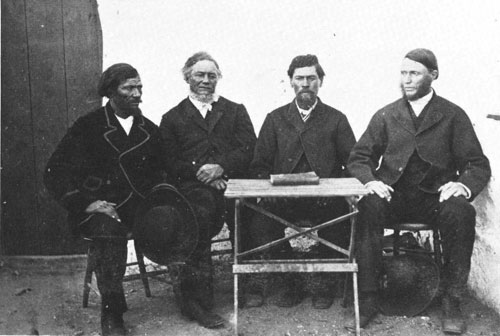 In the 19th century, the frontiers of the
In the 19th century, the frontiers of the
 In this context, the great Herero leader Maharero, still engaged in a bitter war with the Oorlam leader Jonker Afrikaner, heard rumours of a large body of white
In this context, the great Herero leader Maharero, still engaged in a bitter war with the Oorlam leader Jonker Afrikaner, heard rumours of a large body of white 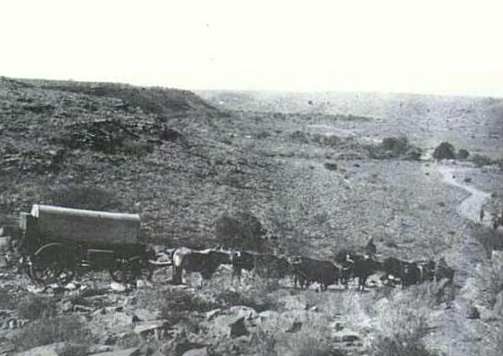 To head the commission, Molteno chose William Palgrave, a gentle and learned man who had spent many years living with the Herero and knew many of the traditional leaders personally. Palgrave initially declined. He claimed that his personal friendships with some of the Herero leaders, such as Maharero and Shikongo, meant that he could not be fully impartial with regard to the region's conflicts. Charles Brownlee was therefore temporarily suggested as a replacement. However, on Molteno's insistence, Palgrave accepted. So finally, in 1876, Palgrave entered the arid vastness of South West Africa as "Special Commissioner to Hereroland and Namaland", with a multi-ethnic assemblage of personnel and a long train of ox-wagons.
To head the commission, Molteno chose William Palgrave, a gentle and learned man who had spent many years living with the Herero and knew many of the traditional leaders personally. Palgrave initially declined. He claimed that his personal friendships with some of the Herero leaders, such as Maharero and Shikongo, meant that he could not be fully impartial with regard to the region's conflicts. Charles Brownlee was therefore temporarily suggested as a replacement. However, on Molteno's insistence, Palgrave accepted. So finally, in 1876, Palgrave entered the arid vastness of South West Africa as "Special Commissioner to Hereroland and Namaland", with a multi-ethnic assemblage of personnel and a long train of ox-wagons.
 Palgrave undertook a total of 5 commissions to South West Africa, of which the first were the biggest.
Travel was arduous and dangerous, in a desert country with no infrastructure and unsettled nomads. However Palgrave knew much of the country well from his youth, and many of his personnel were local men who were also knowledgeable of the enormous land. They generally travelled at night, so as to avoid the deadly heat of the desert. When arriving in settlements like Okahandja,
Palgrave undertook a total of 5 commissions to South West Africa, of which the first were the biggest.
Travel was arduous and dangerous, in a desert country with no infrastructure and unsettled nomads. However Palgrave knew much of the country well from his youth, and many of his personnel were local men who were also knowledgeable of the enormous land. They generally travelled at night, so as to avoid the deadly heat of the desert. When arriving in settlements like Okahandja,
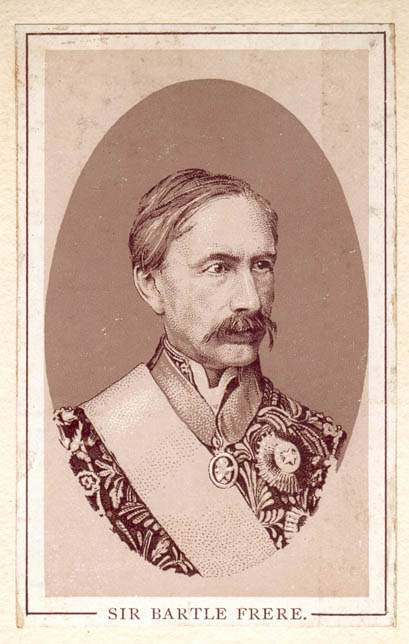

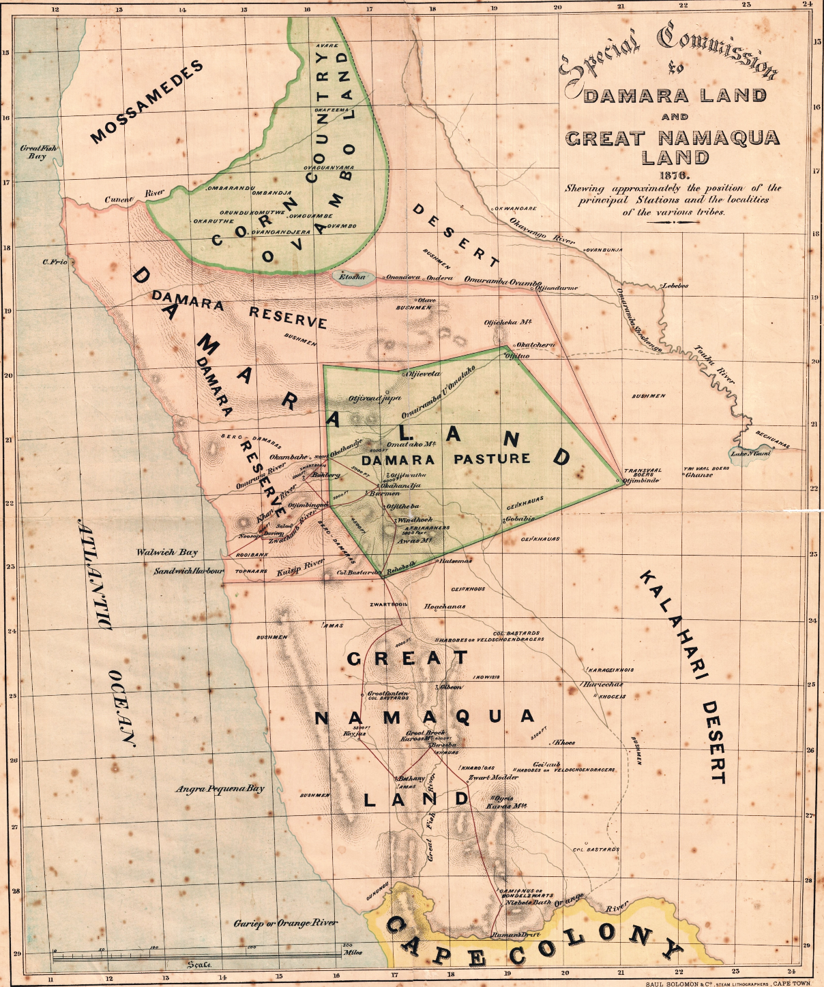
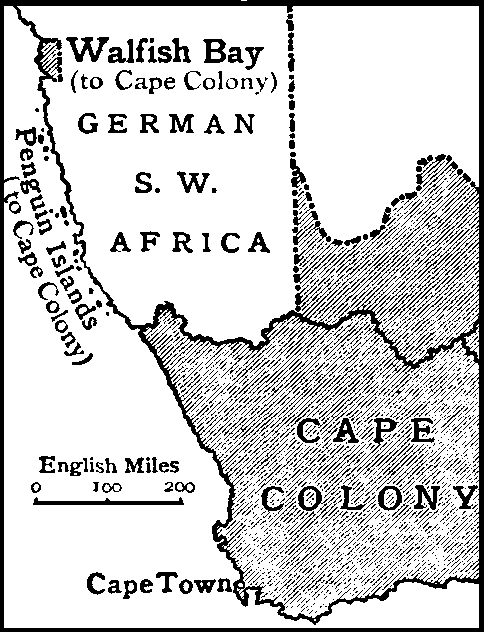 Palgrave's commission was increasingly undermined by the growing tension between the local Cape government and the British Empire.
The Cape Colony had attained a degree of independence, but its first Prime Minister,
Palgrave's commission was increasingly undermined by the growing tension between the local Cape government and the British Empire.
The Cape Colony had attained a degree of independence, but its first Prime Minister,

 The Palgrave Commission (1876–1885) was a series of diplomatic missions undertaken by Special Commissioner William Coates Palgrave (1833–1897) to the territory of
The Palgrave Commission (1876–1885) was a series of diplomatic missions undertaken by Special Commissioner William Coates Palgrave (1833–1897) to the territory of South West Africa
South West Africa was a territory under Union of South Africa, South African administration from 1915 to 1990. Renamed ''Namibia'' by the United Nations in 1968, Independence of Namibia, it became independent under this name on 21 March 1990. ...
(modern Namibia
Namibia, officially the Republic of Namibia, is a country on the west coast of Southern Africa. Its borders include the Atlantic Ocean to the west, Angola and Zambia to the north, Botswana to the east and South Africa to the south; in the no ...
). Palgrave was commissioned by the Cape Government to meet with the leaders of the nations of Hereroland and Namaland, hear their wishes regarding political sovereignty, and relay the assembled information to the Cape Colony Government.
In the early 1870s, South West Africa was torn by internecine warfare and threatened with impending invasion and colonisation by Portugal, Germany and the Boers. In desperation, several local leaders requested incorporation into the relatively peaceful Cape Colony, with the promise of equal representation in the Cape Parliament
The Parliament of the Cape of Good Hope functioned as the legislature of the Cape Colony, from its founding in 1853, until the creation of the Union of South Africa in 1910, when it was dissolved and the Parliament of South Africa was establish ...
. The Cape Government commissioned Palgrave to investigate, and Palgrave recommended that South West Africa be incorporated into the Cape and its inhabitants granted equal political rights.
This would have resulted in a new state, comprising the Cape and modern Namibia
Namibia, officially the Republic of Namibia, is a country on the west coast of Southern Africa. Its borders include the Atlantic Ocean to the west, Angola and Zambia to the north, Botswana to the east and South Africa to the south; in the no ...
. However the breakdown in relations between the local Cape government and the British Imperial government prevented it from being implemented. The region remained vulnerable without a unified state structure, and was taken over and colonised by Germany soon afterwards.
History
Background

 In the 19th century, the frontiers of the
In the 19th century, the frontiers of the Cape Colony
The Cape Colony (), also known as the Cape of Good Hope, was a British Empire, British colony in present-day South Africa named after the Cape of Good Hope. It existed from 1795 to 1802, and again from 1806 to 1910, when it united with three ...
and the neighbouring Boer republics were inhabited by expanding waves of semi-nomadic farmers. These Afrikaans-speaking nomads included the mixed-race Oorlam, Griqua and Baster
The Basters (also known as Baasters, Rehobothers, or Rehoboth Basters) are a Southern African ethnic group descended from Cape Coloureds and Nama of Khoisan origin. Since the second half of the 19th century, the Rehoboth Baster community has ...
nations as well as the white Trekboers
The Trekboers ( ) were nomadic pastoralists descended from mostly Dutch colonists on the frontiers of the Dutch Cape Colony in Southern Africa. The Trekboers began migrating into the interior from the areas surrounding what is now Cape Town, ...
. Leaving the colonies, they spilled over into neighbouring territories and entered into clashes with the pre-existing African peoples.
In South West Africa
South West Africa was a territory under Union of South Africa, South African administration from 1915 to 1990. Renamed ''Namibia'' by the United Nations in 1968, Independence of Namibia, it became independent under this name on 21 March 1990. ...
, which was as yet uncolonised by Europeans, incursions from the south by mounted gunmen of the Oorlam people
The Oorlam or Orlam people (also known as Orlaam, Oorlammers, Oerlams, or Orlamse Hottentots) are a subtribe of the Nama people, largely assimilated after their migration from the Cape Colony (today, part of South Africa) to Namaqualand and D ...
began in the late 18th century. After decades of war with the Damara, Nama and Herero people
The Herero () are a Bantu people, Bantu ethnic group inhabiting parts of Southern Africa. 178,987 Namibians identified as Ovaherero in the 2023 census. They speak Otjiherero, a Bantu language. Though the Herero primarily reside in Namibia, there ...
, they established a powerful semi-nomadic state in the area of modern Windhoek
Windhoek (; ; ) is the capital and largest city of Namibia. It is located in central Namibia in the Khomas Highland plateau area, at around above sea level, almost exactly at the country's geographical centre. The population of Windhoek, which ...
, under their dynamic leader Jan Jonker Afrikaner.
In 1868, a second group, the Baster
The Basters (also known as Baasters, Rehobothers, or Rehoboth Basters) are a Southern African ethnic group descended from Cape Coloureds and Nama of Khoisan origin. Since the second half of the 19th century, the Rehoboth Baster community has ...
s, began to push north into South West Africa. In the ensuing conflict with the other nations of the area, they established a republic and parliament in 1872, around the settlement of Rehoboth. From the 1870s however, increasing numbers of white Trekboers
The Trekboers ( ) were nomadic pastoralists descended from mostly Dutch colonists on the frontiers of the Dutch Cape Colony in Southern Africa. The Trekboers began migrating into the interior from the areas surrounding what is now Cape Town, ...
began to enter South West Africa from the east, causing even worse internecine warfare.
Furthermore, as the scramble for Africa
The Scramble for Africa was the invasion, conquest, and colonialism, colonisation of most of Africa by seven Western European powers driven by the Second Industrial Revolution during the late 19th century and early 20th century in the era of ...
loomed, several observant local leaders became aware that full European colonisation of the territory was probably on the way.
Creation of the Commission (1876)
 In this context, the great Herero leader Maharero, still engaged in a bitter war with the Oorlam leader Jonker Afrikaner, heard rumours of a large body of white
In this context, the great Herero leader Maharero, still engaged in a bitter war with the Oorlam leader Jonker Afrikaner, heard rumours of a large body of white Trekboers
The Trekboers ( ) were nomadic pastoralists descended from mostly Dutch colonists on the frontiers of the Dutch Cape Colony in Southern Africa. The Trekboers began migrating into the interior from the areas surrounding what is now Cape Town, ...
preparing to leave the Transvaal Boer Republic to invade South West Africa and establish another Boer republic there. These rumours were in fact correct, as the " Dorsland Trekkers" were mobilising, and their great migration was soon to begin.
Motivated by the combined severity of the situation, from 1874 Maharero began sending diplomatic missions southwards, to the Parliament of the Cape of Good Hope
The Parliament of the Cape of Good Hope functioned as the legislature of the Cape Colony, from its founding in 1853, until the creation of the Union of South Africa in 1910, when it was dissolved and the Parliament of South Africa was establi ...
.
The Cape, under its local system of "Responsible Government
Responsible government is a conception of a system of government that embodies the principle of parliamentary accountability, the foundation of the Westminster system of parliamentary democracy. Governments (the equivalent of the executive br ...
", had recently attained a degree of independence from the British Empire. Its locally elected parliament was viewed by many in southern Africa as being relatively benign and inclusive, as compared to the other more oppressive states of the region. It implemented a multi-racial franchise, laws prohibiting racial discrimination and legal protection of African traditional land from white appropriation.
Maharero therefore chose the Cape for his overture, first requesting long-term assistance and protection, and later requesting incorporation of his people into the Cape's parliamentary democracy.
The Cape Parliament responded to Maharero's request with a set of proposed scenarios. On the one extreme, some parliamentary factions favoured total non-involvement. On the other extreme, many favoured full annexation to the Cape Colony with all the political rights that would entail. The Cape Prime Minister John Molteno
Sir John Charles Molteno (; 5 June 1814 – 1 September 1886) was a politician and businessman who served as the first Prime Minister of the Cape Colony from 1872 to 1878.
Early life
Born in London into a large Anglo-Italian family, Molten ...
concluded that the final decision would depend on the views and wishes of the various nations of South West Africa, and that a delegation must immediately depart to consult them and report back.
 To head the commission, Molteno chose William Palgrave, a gentle and learned man who had spent many years living with the Herero and knew many of the traditional leaders personally. Palgrave initially declined. He claimed that his personal friendships with some of the Herero leaders, such as Maharero and Shikongo, meant that he could not be fully impartial with regard to the region's conflicts. Charles Brownlee was therefore temporarily suggested as a replacement. However, on Molteno's insistence, Palgrave accepted. So finally, in 1876, Palgrave entered the arid vastness of South West Africa as "Special Commissioner to Hereroland and Namaland", with a multi-ethnic assemblage of personnel and a long train of ox-wagons.
To head the commission, Molteno chose William Palgrave, a gentle and learned man who had spent many years living with the Herero and knew many of the traditional leaders personally. Palgrave initially declined. He claimed that his personal friendships with some of the Herero leaders, such as Maharero and Shikongo, meant that he could not be fully impartial with regard to the region's conflicts. Charles Brownlee was therefore temporarily suggested as a replacement. However, on Molteno's insistence, Palgrave accepted. So finally, in 1876, Palgrave entered the arid vastness of South West Africa as "Special Commissioner to Hereroland and Namaland", with a multi-ethnic assemblage of personnel and a long train of ox-wagons.
Palgrave's 5 missions
 Palgrave undertook a total of 5 commissions to South West Africa, of which the first were the biggest.
Travel was arduous and dangerous, in a desert country with no infrastructure and unsettled nomads. However Palgrave knew much of the country well from his youth, and many of his personnel were local men who were also knowledgeable of the enormous land. They generally travelled at night, so as to avoid the deadly heat of the desert. When arriving in settlements like Okahandja,
Palgrave undertook a total of 5 commissions to South West Africa, of which the first were the biggest.
Travel was arduous and dangerous, in a desert country with no infrastructure and unsettled nomads. However Palgrave knew much of the country well from his youth, and many of his personnel were local men who were also knowledgeable of the enormous land. They generally travelled at night, so as to avoid the deadly heat of the desert. When arriving in settlements like Okahandja, Walvis Bay
Walvis Bay (; ; ) is a city in Namibia and the name of the bay on which it lies. It is the List of cities in Namibia, second largest city in Namibia and the largest coastal city in the country. The city covers an area of of land.
The bay is a ...
and Otjimbingwe, they were usually expected, and treated as honoured guests by the local leaders.
Initially, before leaving Cape Town, Palgrave's opinion had been that a simple bilateral treaty and the posting of a magistrate for each nation would suffice to protect and ensure peace in the region. On seeing the current state of the country though, he personally came to feel that full annexation was the only way to bring about peace.
First Commission
In his 1st commission, Palgrave visited Maharero and his government, as well as the local leaders of Omaruru and Ameib, the Basters, the Nama, Damaras, Bondelswarts and the powerful and expansionist Oorlam people of Jonker Afrikaner. His report back to the Cape Parliament was that Maharero formally requested full incorporation, with a magistrate specifically to be based in his own town of Okahandja. The other nations, suffering from the internecine strife, likewise requested incorporation by treaty. Notably, he reported that the Oorlam wished to remain sovereign. However his conclusion was that annexation was overwhelmingly favoured by the leaders and people of the region, and that it was the only way of ending the devastating warfare that was engulfing the region. Back in Cape Town, additional recommendations included: * Establishing a magistrate-system, centred on Okahandja, with field-cornets in the smaller settlements. The Cape Parliament would be expanded to represent the additional voters. * A recognition of any customary tribal laws, such as did not conflict with fundamental rights to life and property and which did not involve violence or "marauding". * The ensuring that, before accession, each tribe's leadership was entirely aware of (and in accordance with) the main body of Cape law as it applied to them * Agreeing with the local leaders on the introduction of additional laws to prevent the flow of liquor imports into the country. The Cape government immediately agreed to incorporation, but other forces were at play in southern Africa that would prevent it.Fall-out between the Cape and the British government



 Palgrave's commission was increasingly undermined by the growing tension between the local Cape government and the British Empire.
The Cape Colony had attained a degree of independence, but its first Prime Minister,
Palgrave's commission was increasingly undermined by the growing tension between the local Cape government and the British Empire.
The Cape Colony had attained a degree of independence, but its first Prime Minister, John Molteno
Sir John Charles Molteno (; 5 June 1814 – 1 September 1886) was a politician and businessman who served as the first Prime Minister of the Cape Colony from 1872 to 1878.
Early life
Born in London into a large Anglo-Italian family, Molten ...
, was engaged in a growing struggle with the British Governor, Sir Henry Bartle Frere for control over the Cape's external relations (of which Palgrave's commission formed a part). This caused the British Imperial Government first to push for the annexation, but then to actively forestall it as a way of putting pressure on the Cape government. This fatally undermined Palgrave's work.
Nonetheless, aside from any humanitarian considerations, the Cape began to have serious strategic reasons for wanting to secure South West Africa. It correctly predicted the invasion of this area by an imperialist European power (in this case, Imperial Germany
The German Empire (),; ; World Book, Inc. ''The World Book dictionary, Volume 1''. World Book, Inc., 2003. p. 572. States that Deutsches Reich translates as "German Realm" and was a former official name of Germany. also referred to as Imperia ...
), and it wished to protect the flank of the new Kimberley diamond fields. It was also very aware of the need to secure the only viable harbour of the region (Walvis Bay) and the trade routes to the north.
The British government believed it to be a strife-torn territory which was of no significant value. A reflection of its ignorance of the land was Lord Carnarvon's belief that Walvis Bay was the port for Kimberley. The British government wanted to implement a system of confederation
A confederation (also known as a confederacy or league) is a political union of sovereign states united for purposes of common action. Usually created by a treaty, confederations of states tend to be established for dealing with critical issu ...
in Southern Africa under British control. The Cape government rejected this Confederation plan, as it predicted (correctly) that it would lead to war with the Boer Republics. However, Bartle Frere used his ability to obstruct the implementation of Palgrave's work as a tactical tool, to pressurise the Cape government to agree to confederation.
Failing to persuade the Cape government, Bartle Frere dissolved it, and assumed direct control of the country to enforce the Confederation system. The Confederation plan collapsed as predicted, culminating in the Anglo-Zulu War
The Anglo-Zulu War was fought in present-day South Africa from January to early July 1879 between forces of the British Empire and the Zulu Kingdom. Two famous battles of the war were the Zulu victory at Battle of Isandlwana, Isandlwana and th ...
and the First Boer War
The First Boer War (, ), was fought from 16 December 1880 until 23 March 1881 between the United Kingdom of Great Britain and Ireland, United Kingdom and Boers of the Transvaal (as the South African Republic was known while under British ad ...
.
In a peculiar step, the incorporation of Walvis Bay
Walvis Bay (; ; ) is a city in Namibia and the name of the bay on which it lies. It is the List of cities in Namibia, second largest city in Namibia and the largest coastal city in the country. The city covers an area of of land.
The bay is a ...
and the offshore islands was then authorised by the British in 1878, while the rest of the country remained in legal limbo until the Germans arrived.
Subsequent Commissions
Palgrave's following trips coincided with a sharp deterioration in the conditions in South West Africa. Among the overall rise in violence, notable was the renewed military expansion of Jonker Afrikaner's Oorlam. Meanwhile, the Herero polity began to fragment, the Basters came under growing attack, and the migration of Boer "Thirst Trekkers" approached from the Transvaal (in the end, in fact, for all the fear they generated among the locals, the trekkers ended up in a state of near starvation in the Kaokoveld, decimated by the harsh climate.) Related to the rise in violence, local leaders' trust in Palgrave declined. Maharero, no longer relying directly on Palgrave, sent his son Willem on a diplomatic mission to Cape Town to negotiate with the new pro-imperialist Prime Minister, John Gordon Sprigg. The Oorlam broke off relations completely, and Palgrave even had to flee the fighting as further fighting broke out between the Herero and the Nama, and his staff largely deserted him. As the various political factions in the British administration of the Cape disagreed and delayed, the unrest in South West Africa continued. Finally, as predicted, the German Colonisers arrived.German invasion (1884)
In 1883, a German trader, Adolf Lüderitz bought a section of coast, renamed it after himself, and advised the German chancellorOtto von Bismarck
Otto, Prince of Bismarck, Count of Bismarck-Schönhausen, Duke of Lauenburg (; born ''Otto Eduard Leopold von Bismarck''; 1 April 1815 – 30 July 1898) was a German statesman and diplomat who oversaw the unification of Germany and served as ...
to annex and occupy South West Africa, before the Cape did. In 1884 Bismarck did so, thereby establishing German South West Africa
German South West Africa () was a colony of the German Empire from 1884 until 1915, though Germany did not officially recognise its loss of this territory until the 1919 Treaty of Versailles.
German rule over this territory was punctuated by ...
as a colony (Deutsch-Südwestafrika in German).
Too late, the Cape tried to forestall the German invasion. Surrounded by bitter accusations from his former staff and in the context of the German expansion, Palgrave departed for his 5th and final commission in 1884. Once again, he conveyed a desperate request for incorporation from Maharero and other leaders. Once again, the British Imperial Government adopted its own course and vacillated, and when Palgrave arrived back in Cape Town he learned that the Imperial government had recognised German authority over the South West African hinterland.
Aftermath and legacy
The failure of the Palgrave Commission was due primarily due to ill-advised interference in the affairs of southern Africa by the British Colonial Office in London, whose obstruction of the commission led to German colonisation of South West Africa. The subsequent wars, rebellions and resultingHerero and Namaqua Genocide
Herero may refer to:
* Herero people, a people belonging to the Bantu group, with about 240,000 members alive today
* Herero language, a language of the Bantu family (Niger-Congo group)
* Herero and Nama genocide
* Herero chat, a species of bi ...
all ensued from German colonisation.
However, it is difficult to hypothesize on what would have resulted if the Palgrave Commission had succeeded. The hypothetical enlarged state would have included the entire (predominantly mixed-race and Afrikaans-speaking) western half of southern Africa, corresponding largely to the dry, winter-rainfall climatic area, and holding abundant mineral resources. It would also have inherited a relatively liberal, inclusive and multi-racial political system. Had it not been united with the Boer republics and the Johannesburg mines that seeded apartheid
Apartheid ( , especially South African English: , ; , ) was a system of institutionalised racial segregation that existed in South Africa and South West Africa (now Namibia) from 1948 to the early 1990s. It was characterised by an ...
, it is possible that this region would have avoided that most unfortunate part of history. A social development akin to that of Brazil might have followed, but with no way of predicting either way, no judgement can be made.
Palgrave himself became increasingly critical, both of the Herero and Nama leadership, and of the British authorities he was working for. Having worked for nearly a decade on a project that was now a failure, he retired. The question has yet to be resolved, of whether he was a hard-working and well-intentioned diplomat attempting to pre-empt the German colonial invasion, or whether he was merely another agent of oppressive colonialism.E. L. P. Stals: ''The Commissions of W. C. Palgrave: Special Emissary to South West Africa, 1876–1885'' Van Riebeeck Society, The, 1991. xxxiii.
See also
* History of Namibia * Maharero *Union of South Africa
The Union of South Africa (; , ) was the historical predecessor to the present-day South Africa, Republic of South Africa. It came into existence on 31 May 1910 with the unification of the British Cape Colony, Cape, Colony of Natal, Natal, Tra ...
* Penguin Islands
References
{{Authority control Colonial people in South West Africa 19th century in Africa British colonisation in Africa International commissions 1876 establishments in the Cape Colony 1876 in South Africa